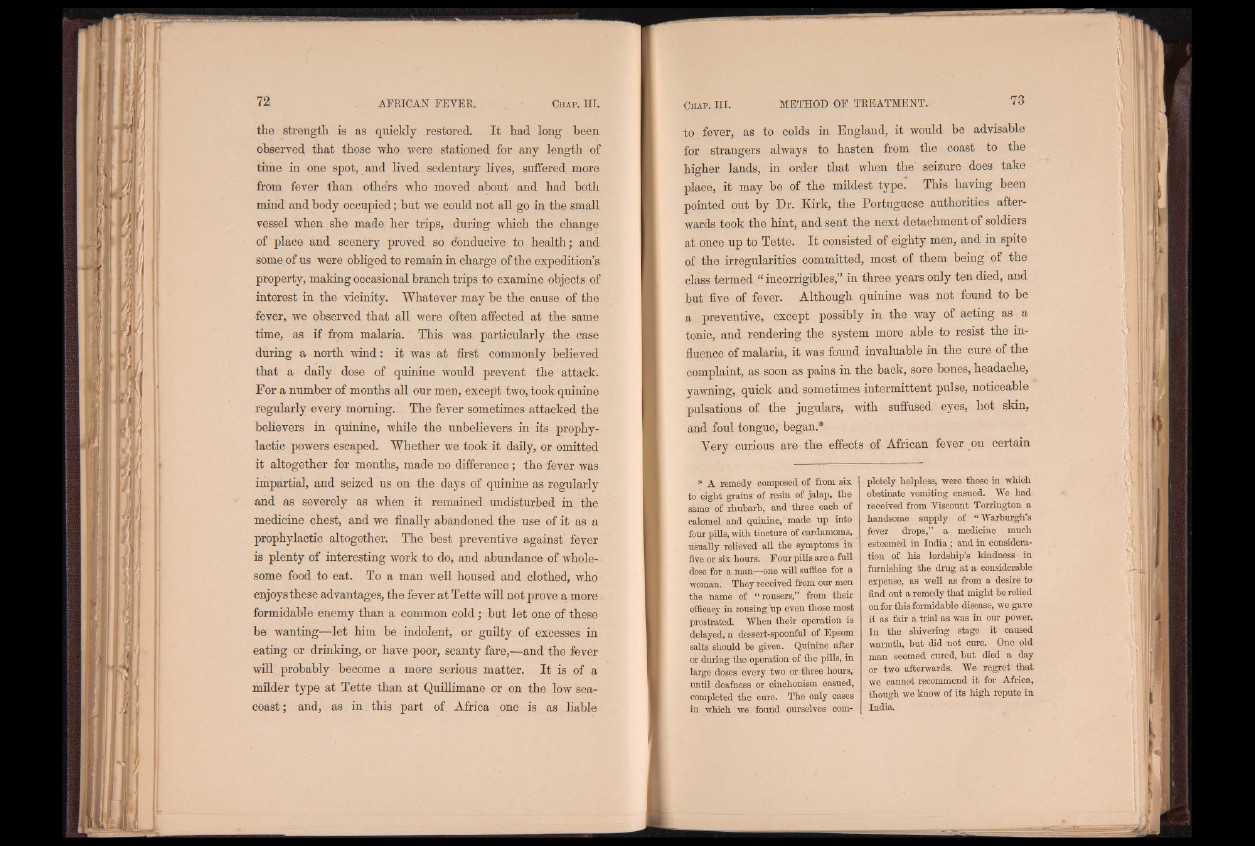
the strength is as quickly restored. I t had long been
observed, that those who were stationed for any length of
time in one spot, and lived sedentary lives, suffered more
from fever than others who moved about and had both
mind and body occupied; hut we could not all go in the small
vessel when she made her trips, during which the change
of place and scenery proved so conducive to health; and
some of us were obliged to remain in charge of the expedition’s
property, making occasional branch trips to examine objects of
interest in the vicinity. Whatever may he the cause of the
fever, we ohserved that all were often affected at the same
time, as if from malaria. This was particularly the case
during a north wind: it was at first commonly believed
that a daily dose of quinine would prevent the attack.
For a number of months all our men, except two, took quinine
regularly every morning. The fever sometimes attacked the
believers in quinine, while the unbelievers in its prophylactic
powers escaped. Whether we took it daily, or omitted
it altogether for months, made no difference; the fever was
impartial, and seized us on the days of quinine as regularly
and as severely as when it remained undisturbed in the
medicine chest, and we finally abandoned the use of it as a
prophylactic altogether. The best preventive against fever
is plenty of interesting work to do, and abundance of wholesome
food to eat. To a man well housed and clothed, who
enjoys these advantages, the fever at Tette will not prove a more
formidable enemy than a common cold; but let one of these
be wanting—let him be indolent, or guilty of excesses in
eating or drinking, or have poor, scanty fare,—and the fever
will probably become a more serious matter. I t is of a
milder type at Tette than at Quillimane or on the low sea-
coast; and, as in this part of Africa one is as liable
to fever, as to colds in England, it would be advisable
for strangers always to hasten from the coast to the
higher lands, in order that when the seizure does take
place, it may be of the mildest type.' This having been
pointed put by Dr. Kirk, the Portuguese authorities afterwards
took the hint, and sent the next detachment of soldiers
at once up to Tette. I t consisted of eighty men, and in spite
of the irregularities committed, most of them being of the
class termed “ incorrigibles,” in three years only ten died, and
but five of fever. Although quinine was not found to be
a preventive, except possibly in the way of acting as a
tonic, and rendering the system more able to resist the influence
of malaria, it was found invaluable in the cure of the
complaint, as soon as pains in the back, sore bones, headache,
yawning, quick and sometimes intermittent pulse, noticeable
pulsations of the jugulars, with suffused eyes, hot skin,
and foul tongue, began*
Very curious are the effects of African fever on certain
* A remedy composed of from six
to eiglit grains of resin of jalap, the
same' of rhubarb, and three each of
calomel and quinine, made up into
four pills, with tincture of cardamoms,
usually relieved all the symptoms in
five or six hours. Four pills are a full
dose for a man—one will suffice for a
woman. They received from our men
the name of “ rousers,” from their
efficacy in rousing up even those most
prostrated. When their operation is
delayed, a dessert-spoonful of Epsom
salts should be given. Quinine after
or during the operation of the pills, in
large doses every two or three hours,
until deafness or cinchonism ensued,
completed the cure. The only cases
in which we found ourselves completely
helpless, were those in which
obstinate vomiting ensued. We had
received from Viscount Torrington a
handsome supply of “Warburgh's
fever drops,” a medicine much
esteemed in India ; and in consideration
of his lordship’s kindness in
furnishing the drug at a considerable
expense, as well as from a desire to
find out a remedy that might be relied
on for this formidable disease, we gave
it as fair a trial as was in our power.
In the shivering stage it caused
warmth, but did not cure. One old
man seemed cured, but died a day
or two afterwards. We regret that
we cannot recommend it for Africa,
though we know of its high repute in
India.